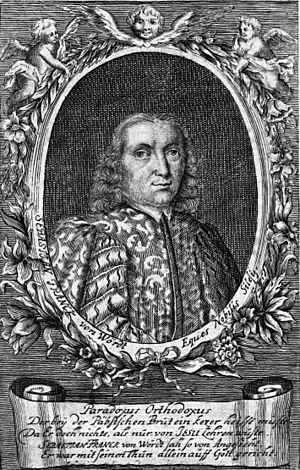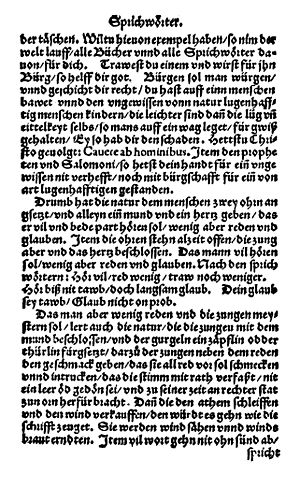Sebastian Franck facts for kids
Sebastian Franck was a German thinker and writer from the 1500s. He was born in Donauwörth, Swabia, around 1499 and died in Basel, Switzerland, about 1543. Franck was known for his independent ideas and his belief in human potential. He was also part of a movement called the Radical Reformation, which sought big changes in religion.
Contents
Early Life and Beliefs
Sebastian Franck was born in 1499 in a place called Donauwörth in Swabia. Because of his birthplace, he sometimes called himself "Franck von Wörd." He started studying at the University of Ingolstadt in 1515. Later, he went to Bethlehem College, which was part of the university.
At college, he met other important thinkers like Martin Bucer. He might have even heard Martin Luther speak in 1518. Franck first became a priest. But in 1525, he joined the Reformed group in Nuremberg and became a preacher.
Early Writings and Marriage
Franck's first book was a German translation of a work by Andrew Althamer. This book argued against certain religious groups, like the Anabaptists. In 1528, Franck married Ottilie Beham. She was thought to be the sister of famous painters Bartholomew and Sebald Beham. These painters were students of the well-known artist Albrecht Dürer.
In the same year, Franck wrote a book about avoiding drunkenness. In 1529, he translated an English book called Supplycacyon of the Beggers. This book was written by an English Protestant named Simon Fish.
Moving and Publishing
As Franck's religious ideas grew, he looked for a place with more freedom. In 1529, he moved to Strasbourg. There, he translated a Latin book about Turkey. He added his own thoughts, suggesting that Turks could sometimes be good examples for Christians.
He also believed in an "invisible spiritual church." This church would be for everyone, not just specific groups like Lutherans or Anabaptists. He stayed true to this idea throughout his life.
Important Works and Challenges
In Strasbourg, Franck became friends with Kaspar Schwenkfeld. In 1531, he published his most important work, the Chronica. This book was a history of the world. In it, he showed great understanding for people with different beliefs. He also supported freedom of opinion.
Because of his ideas, authorities forced him to leave Strasbourg. After a short time in prison in 1531, he tried to work as a soap maker in Esslingen in 1532. In 1533, he moved to Ulm for better business. He became a citizen of Ulm in 1534.
His book Weltbuch was printed in 1534. It was a follow-up to his Chronica. Also in 1534, he published Paradoxa, which caused problems with the authorities. They ordered him to leave Ulm, but he promised to have his future books checked first.
Franck thought this rule only applied to books printed in Ulm. So, in 1538, he published Guldin Arch in Augsburg and Germaniae chronicon in Frankfort. As a result, he had to leave Ulm in January 1539.
Later Life and Legacy
After leaving Ulm, Sebastian Franck did not have a permanent home. He found work as a printer in Basel. He likely died there in the winter of 1542–1543.
In 1539, he published several books, including Kriegbuchlein des Friedens. He also wrote Das verbutschierte mit sieben Siegein verschlossene Buch, which was a guide to the Bible. In 1541, he published Spruchwörter, a collection of proverbs. His book Paradoxa was re-released in 1542.
Sebastian Franck believed strongly in freedom of thought. He also believed that God speaks to people through a special part of the divine inside each person. He felt that the church, as a human organization, could not truly express this inner message from God.
He once wrote that "God is an unutterable sigh, lying in the depths of the heart." This quote shows his deep spiritual beliefs.
Writings
- Autobiographical Letter to Johann Campanus (1531)
- Weltbuch (1534)
- Chronicle of Germany (1538)
- Golden Arch (1538)
- A Universal Chronicle of the World's History from the Earliest Times to the Present
- Book of the Ages
- Chronicle and Description of Turkey
- Paradoxa (1534)
- Preface and Translation into German of Althamer's Diallage
- Seven Sealed Book (1539)
- Tree of Knowledge of Good and Evil
- Translation with Additions of Erasmus' Praise of Folly
- The Vanity of Arts and Sciences
See also
 In Spanish: Sebastian Franck para niños
In Spanish: Sebastian Franck para niños
 | Georgia Louise Harris Brown |
 | Julian Abele |
 | Norma Merrick Sklarek |
 | William Sidney Pittman |



